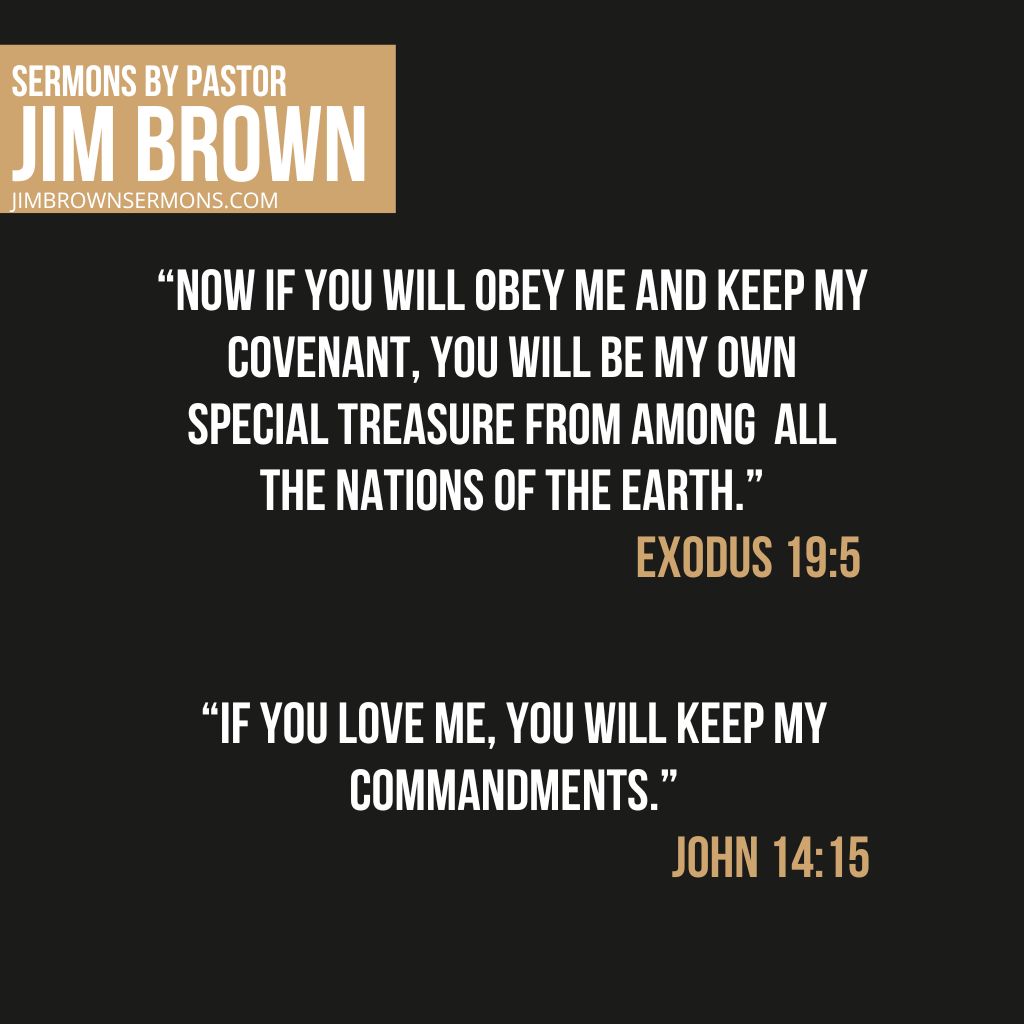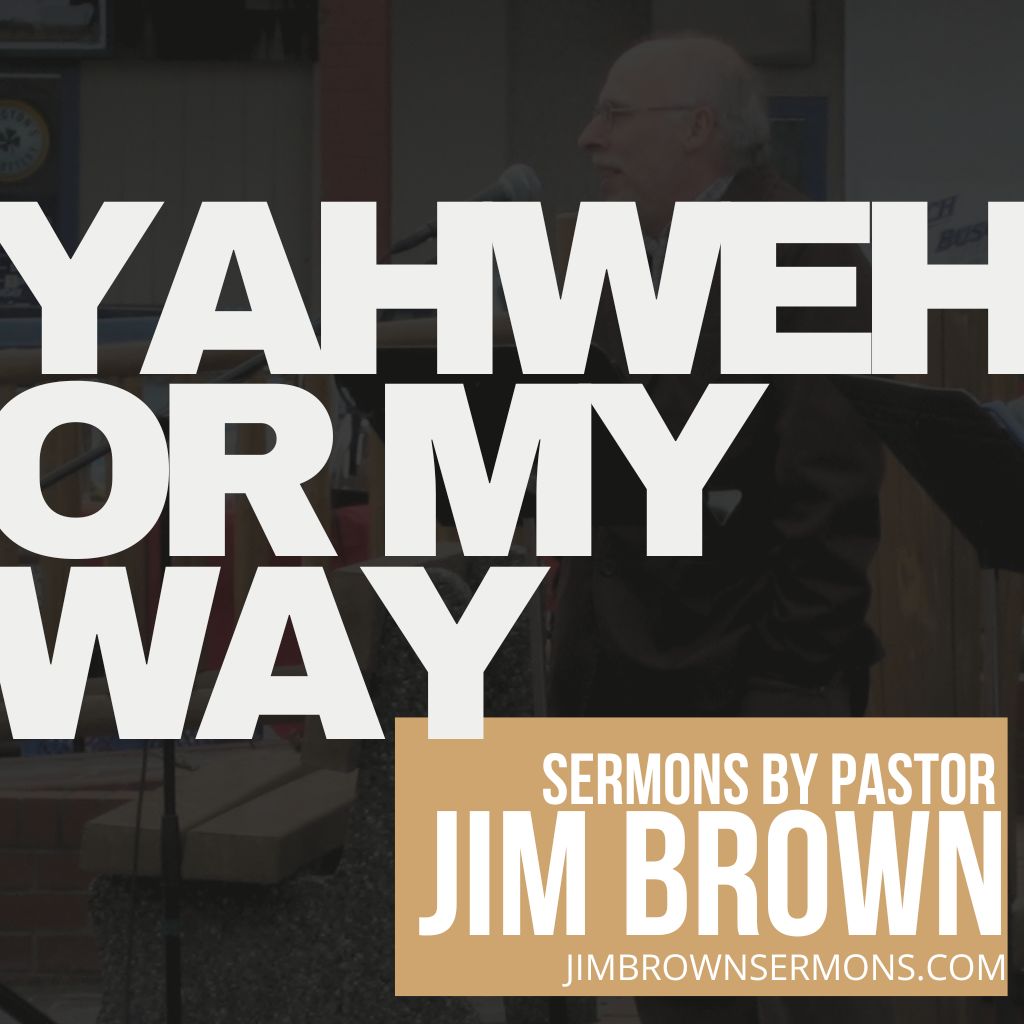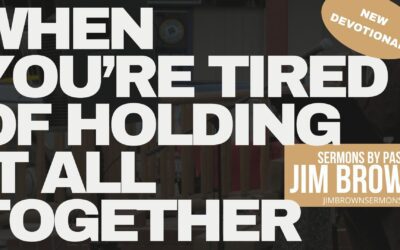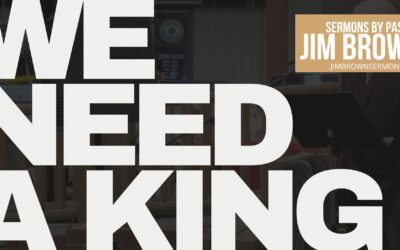FEBRUARY 21, 2025
EP 14: Good Enough Isn’t Good Enough | The Truth About A Relationship With God
Exodus 18, Leviticus, Numbers
Some things in life just aren’t good enough—like a shaky workbench that can’t hold weight or a faith that rests on doing just enough. A real relationship with God isn’t about checking off spiritual to-do lists—it’s about trust, obedience, and faith. If you’ve ever wondered whether you’re missing something deeper in your walk with God, this message is for you. Let’s dive into what it truly means to live by Biblical faith and why ‘good enough’ will never be enough.
Sermon Study Resources
Sermon Notes
Your Subtitle Goes Here
Sermon Notes:
Good Enough Isn’t Good Enough | The Truth About a Relationship with God
📖 Main Scripture: Exodus 18, Leviticus, Numbers
Introduction: A Gift You Don’t Know What to Do With
- Have you ever received a gift you didn’t know what to do with?
- The law of God is often seen as that kind of “gift” – something people don’t understand or know how to apply.
- The central question: What does it truly mean to have a relationship with God?
- Many people think faith is about “doing enough” or following the right rules. But God is after faithfulness, not performance.
The Broken Relationship & God’s Plan for Restoration
🔹 Exodus 18 – God’s plan to restore His people began after their deliverance from Egypt.
🔹 The problem: The relationship between God and humanity was broken by sin (Genesis 3).
🔹 God’s desire: A personal, faithful relationship with His people, not a set of rules to earn salvation.
📖 Exodus 19:5 (NIV)
“Now if you obey me fully and keep my covenant, then out of all nations you will be my treasured possession. Although the whole earth is mine.”
🙌 Key Truth: Obedience to God is not about “earning” His love—it is about living in response to His grace.
Jesus Fulfills the Law – Not Abolishes It
- Some people misunderstand the Old Testament law as something “burdensome” or “opposed to grace.”
- The law was never about salvation by works—it was about setting apart God’s people as holy.
- Jesus fulfills the law, not by getting rid of it, but by perfectly living it out and providing salvation.
📖 Matthew 5:17 (ESV)
“Do not think that I have come to abolish the Law or the Prophets; I have not come to abolish them but to fulfill them.”
📖 Jesus Christ the same yesterday today and forever (Hebrews 13:8).
- God has always been a God of grace, from the Old Testament to today.
- Faithfulness to God remains the foundation of a real relationship with Him.
The Law Was Given to Set God’s People Apart
🔹 Exodus 20 introduces the 10 Commandments, which were meant to shape Israel as a holy nation.
🔹 Leviticus focuses on holiness in the Bible—not just for external obedience, but to reflect God’s character.
🔹 Numbers continues teaching on faithfulness and the consequences of rejecting God’s way.
🙌 Key Takeaway: The law wasn’t given to be a burden, but a gift—an invitation to be God’s people.
📖 Leviticus 20:26 (NIV)
“You must be holy because I, the Lord, am holy. I have set you apart from all other people to be my very own.”
📖 1 John 2:15 (NLT)
“Do not love this world nor the things it offers you, for when you love the world, you do not have the love of the Father in you.”
- The call to be set apart for God still applies to believers today.
Faith and Obedience: A Response to God’s Grace
🔹 The Christian life is not about trying to be “good enough.”
🔹 Faith and obedience go hand in hand—we obey because we trust God.
📖 James 1:25 (NLT)
“But if you look carefully into the perfect law that sets you free, and if you do what it says and don’t forget what you heard, then God will bless you for doing it.”
🙌 Faith is not about fear—it’s about trust.
- Faith over fear means surrendering our own way and trusting God completely.
- Some people ask: How much is enough? What’s the minimum I have to do to follow God?
- But that’s the wrong question—faithfulness means total surrender, not bare-minimum effort.
📖 Romans 14:5-8 (NIV)
“One person considers one day more sacred than another; another considers every day alike. Each of them should be fully convinced in their own mind. Whoever regards one day as special does so to the Lord… If we live, we live for the Lord; and if we die, we die for the Lord. So, whether we live or die, we belong to the Lord.”
God’s Law and Our Freedom in Christ
🔹 Some people see God’s law as restricting—but it actually sets us free.
🔹 Without order, there is chaos—just as laws in society protect us, God’s laws protect our souls.
📖 Colossians 2:16 (NLT)
“So don’t let anyone condemn you for what you eat or drink, or for not celebrating certain holy days or new moon ceremonies or Sabbaths.”
📖 James 1:25 (NLT)
“Look carefully into the perfect law that sets you free… then God will bless you for doing it.”
🙌 God’s commands lead to freedom, not bondage.
- We don’t follow God’s law to earn salvation—we follow it because we love Him.
📖 1 John 4:19 (NIV)
“We love because He first loved us.”
Conclusion: Good Enough Isn’t Good Enough
- The relationship with God is about faithfulness, not rule-following.
- Jesus fulfills the law, and we are called to live by faith, not by fear.
- God’s law sets us apart—not to restrict us, but to lead us into a life of freedom and purpose.
- You don’t have to follow God—but if you do, the standard is high, and the reward is great.
📖 Exodus 19:5 (NIV)
“Now if you obey me fully and keep my covenant, then out of all nations you will be my treasured possession.”
🙌 Final Challenge:
- Will you choose to trust God completely?
- Will you live by faith and obedience, or just “good enough”?
🛠 Next Steps:
✔ Meditate on Exodus 18, Leviticus, and Numbers
✔ Pray for a deeper relationship with God
✔ Trust Jesus Christ, the same yesterday today and forever
✔ Walk in faith over fear
Bible Verses
Your Subtitle Goes Here
Bible Verses
Hebrews 13:8 (NIV)
“Jesus Christ is the same yesterday and today and forever.”
2 Timothy 3:16 (NASB)
“All Scripture is inspired by God and beneficial for teaching, for rebuke, for correction, for training in righteousness.”
John 15:5 (NIV)
“I am the vine; you are the branches. If you remain in me and I in you, you will bear much fruit; apart from me you can do nothing.”
Exodus 33:3-4 (NIV)
“Go up to the land flowing with milk and honey. But I will not go with you, because you are a stiff-necked people and I might destroy you on the way. When the people heard these distressing words, they began to mourn and no one put on any ornaments.”
1 John 2:15 (NLT)
“Do not love this world nor the things it offers you, for when you love the world, you do not have the love of the Father in you.”
1 John 4:19 (NIV)
“We love because he first loved us.”
James 1:25 (NLT)
“But if you look carefully into the perfect law that sets you free, and if you do what it says and don’t forget what you heard, then God will bless you for doing it.”
Exodus 19:5 (NIV)
“Now if you obey me fully and keep my covenant, then out of all nations you will be my treasured possession. Although the whole earth is mine.”
Colossians 2:16 (NLT)
“So don’t let anyone condemn you for what you eat or drink, or for not celebrating certain holy days or new moon ceremonies or Sabbaths.”
Romans 14:5-8 (NIV)
“One person considers one day more sacred than another; another considers every day alike. Each of them should be fully convinced in their own mind. Whoever regards one day as special does so to the Lord. Whoever eats meat does so to the Lord, for they give thanks to God; and whoever abstains does so to the Lord and gives thanks to God. For none of us lives for ourselves alone, and none of us dies for ourselves alone. If we live, we live for the Lord; and if we die, we die for the Lord. So, whether we live or die, we belong to the Lord.”
Leviticus 19:18 (NIV)
“Do not seek revenge or bear a grudge against anyone among your people, but love your neighbor as yourself. I am the Lord.”
Leviticus 20:26 (NIV)
“You are to be holy to me because I, the Lord, am holy, and I have set you apart from the nations to be my own.”
Sermon Slides
Your Subtitle Goes Here


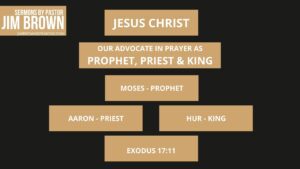
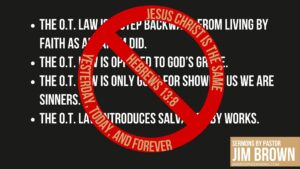
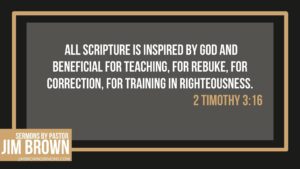
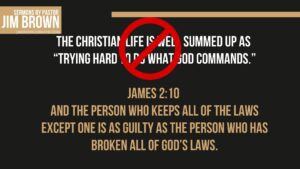
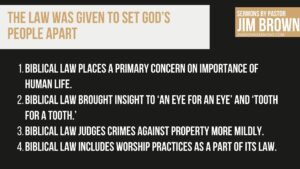
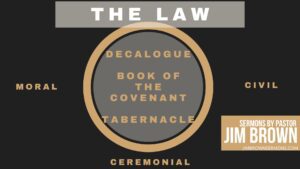
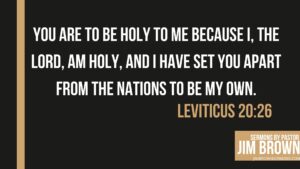
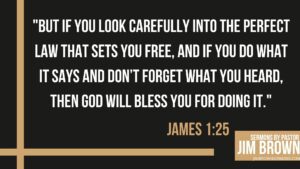
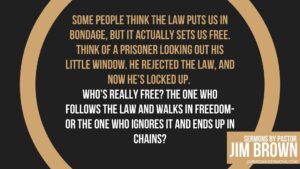
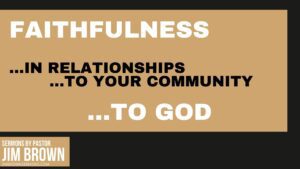
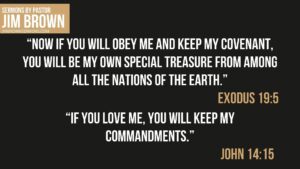
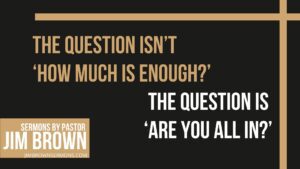


Related Song List
Your Subtitle Goes Here
Recommended Resources
Your Subtitle Goes Here
Books:
- Description: Dr. Stanley shares his personal journey, offering insights into what it means to truly follow Christ, cultivate a genuine relationship with God, and live a life of obedience.
- Description: This compact book delves into the mystery of Christian obedience, bringing readers into the heart of authentic Christian love and a deeper relationship with God.
- Description: Elizabeth George encourages women to embrace radical faith, grow in courage, and live out God’s plan with obedience and trust.
- Description: A classic work focusing on developing an awareness of God’s presence in everyday life, emphasizing continuous communion with Him.
Articles and Blog Posts:
- Description: This article explores the meaning behind Jesus’ statement about fulfilling the law, providing insights into its implications for believers.
Videos:
Description: In this workshop, Don Carson discusses how Jesus fulfills the Old Testament law, offering a deeper understanding of this theological concept.
Some of these above links in this post maybe affiliate links, and we may earn a small commission at no additional cost to you. These are resources that we would recommend regardless of whether we earn a commission or not. The income generated helps cover website maintenance costs, allowing us to continue sharing sermons, resources, and content with you. We appreciate your support!
Sermon Transcript
Your Subtitle Goes Here
Transcript: GOOD ENOUGH ISN’T GOOD ENOUGH | The Truth About A Relationship With God
How many of you have ever received a white elephant gift? Now, I don’t mean an intentional one, I don’t mean one of those white elephant gifts that you were supposed to bring to a party. How many of those that maybe somebody really had a desire to give you something and gave you and you just don’t know what to do with this thing I received and Raylin doesn’t know how to handle this. My dad gave me his workbench and we moved across country, remember? And this thing was when I got, it was 50 years old and I’ve had it for quite a number of years. It’s got to be 80 years old, and every time you go to pick something up off it, you get a sliver under your fingernail. The woods all rotted away. It’s crooked. It was never built. Well, to begin with, you go to lift it up to move it and the boards pop off the top and it weighs a ton.
And she’s like, couldn’t your dad just give you a pocket knife or something? But there’s a lot. I grew up with this thing and when they were moving into a townhouse, they didn’t have room for it. And he says, well, you take the workbench. It’s something that we always were together around, but what do you do with the thing? And I can’t work on it much because it’s just, it’s wobbly and fallen apart and I’ve tried to strengthen it, put some more screws in it and stuff, but we get these things and you just wonder what you’re going to do with them. God always wants to give us things too, and we don’t always know how to look at those things sometimes. So we’re going to be talking about some of those things today a little bit. Just to give you an overview of our Old Testament study here.
The relationship that God had with mankind in the garden was broken when an Adam and Eve sinned, he had a close relationship with him and he wanted one. He wanted one with mankind. But when sin entered the world, that relationship was broken. And even though each one of us has got freedom of choice and we can choose to follow God, we don’t do that. The Bible says that each of us have turned to our own ways and that we lean on our own understanding. We don’t always acknowledge him in our life, but we have the choice to do that. And when we do, it restores that relationship with him. God’s plan for restoring mankind and making a pathway back to him started with Abraham. We saw that in Genesis 12, and then in the book of Exodus, it’s God’s redemption of mankind is really being defined through the people of Israel.
That’s when things are really starting to happen as he starts to really interact with people. It’s been 400 years since Abraham came on the scene, 400 years of silence while they’re in slavery, and God just miraculously delivers the people. There’s the 10 plagues and then the crossing of the Red Sea on dry land. And then as the soldiers all follow them across, the soldiers all get drowned and God leads them in just a miraculous victory there. And we left off Exodus 17 last week when there was a battle between Israel and the Amalekites. And Joshua led into battle. And the battle was really won though by Moses. You remember Moses had to have his arms in the air and as he prayed for the people they won by holding his arms up and also with him that day were Aaron and her. Now they held up his arms because he was getting tired, right?
And Moses was the prophet of Israel. And think of this picture now, these three men on the hill overseeing the battle. He had Moses the prophet, Aaron the priest, and her was the leader of the tribe of Judah, which was the royal tribe in which the kings would come out of together. In prayer, they represent the Lord Jesus Christ. That’s what he is, who is our intercessor. He’s our advocate with the Father as our prophet, our priest, and our king. As we come into recognizing that on a regular basis, moment by moment, acknowledging him as our prophet, our priest, and our king, our relationship with him grows closer and closer, but the more we don’t recognize that and take it on ourself to be our own prophet, to decide for ourself what’s the right thing and wrong thing to do. And the more we don’t allow Jesus to be our priest, but instead we’re going to go to God our way, not his way or not allow him to be the king, the ruler of our life, we will struggle.
That’s just how the old sinful nature wants it, that when it attacks in a moment of weakness wants us to rely on ourself instead of going directly to Jesus. So what’s the next step after God delivers the people through this scene on the hill with Moses, Aaron and her? Well, it’s the giving of the law also known as the mosaic covenant, and that’s where we pick up in Exodus 19. And there’s been a lot of ideas about the law that have become really popular in Christian circles. See if any of these fit your framework of thinking, okay? The Old Testament law is a step backward from living as by faith as Abraham did. Okay? Think about it. The Old Testament law is opposed to God’s grace. The Old Testament law is only good for showing us that we’re sinners. When the Old Testament law introduces salvation by works, you hear a lot of these things floating around.
See the laws received a lot of bad press. I believe that it was therefore our good. How do these things line up with Hebrews 13, eight? Remember that’s sort of the theme verse for going through the Old Testament that Jesus Christ is the same yesterday, today and forever. Has God changed the way he works with us or is he the same? Is he a God of law then and a God of grace now or has he always been a God of grace? See, the law has always been a difficult subject for Christians. We don’t know what to do with it. We kind of see it as a white elephant. We, God gave it to us. It’s in the Bible, but what do you do with the thing? You know, can’t throw it out, but nobody wants it in a prominent place. It’s sort of like, well, you take the 10 commandments and you’ll frame ’em, put ’em in a picture on your dining room or something, but that’s about as far as we want to go with it. But what about all the dietary laws and what about all this stuff about being clean and unclean? What about special celebrations and what God was saying with all that? What do you do with it? Do you throw it out? Do you just pack it away somewhere so you don’t have to look at it like the work bench out in the garden shed?
Well, in second Timothy it says three 16, all scriptures inspired by God and profitable for teaching, for reproof, for correction, and for training and righteousness. What was Paul thinking when he wrote that in terms of the law? The George Barna group did a research study and it was called Christian Beliefs about Spiritual Life and the Church. And one of the survey statements was it was put in a statement form the Christian life is well summed up as trying hard to do what God commands. And people were disposed to respond to this in a manner like strongly agree, agree, disagree, strongly disagree. How would you respond to that statement? Think about it. When you first see it and you’ve got to respond, put something down, agree, strongly agree, disagree, strongly disagree. Well, if you’d respond in an agreement with that statement, basically you’d be with about 57% of the people strongly agree with it. And then if you take somewhat agree, it’s 82% of the people agree with this statement to some extent or another. The problem with this statement is it’s very wrong. How good is good enough? How do you know you’ve done enough?
How hard do you have to try? Do you have to give it everything you’ve got or just enough to get by? See the Christian life and never was an attempt to obey God’s commands and our effort, it’s not performance-based relationship with God any more than our own children would have a performance-based relationship with us. There are children because our blood is running through their veins and Christ’s blood has run for us and he has adopted us as his children, and so therefore it’s not on what we do, but who we are. John 15 five says that apart from Christ, we can do nothing. So it’s not based on our works, it’s based on a relationship with Jesus Christ. Since the beginning of our study in the Old Testament, we have seen that God’s always desired to relate to people in a very personal way, one-on-one.
As Christians, we know this happens through personal faith in Christ and walking in a loving obedience to His word. There’s a difference there. Walking in loving obedience to His word. It’s not a matter of following rules. The introduction of the law in Exodus 20 says, I am the Lord your God. That word, Lord is that word. We’d looked at a little bit last week, Yahweh, which is I am, I was always there. I am with you now and I’ll always be with you. That’s what he’s saying. That’s who I am. He’s beginning the law with reminding them that he’s the God who’s never going to leave him or forsake him, that he’s with them through everything and he wants them to follow him lovingly. See, the law is not some sort of bogus door prize that he gave to the Israelites and said, figure out what to do with this thing now.
It’s an opportunity of a lifetime to be God’s people. That’s what the law is doing. He’s committed himself to them and he’s saying, now, commit yourself to me as my people. They didn’t enter into the relationship with God on the basis of works. Why? What works have they done up to this point? They crossed the Red Sea who parted it. God parted it. All they did was whine about it, and then they complained about the food and the water, right? So far so good. And then wild parties that he had to interrupt and the following, after false gods so far, they did nothing to deserve being in relationship with God. So their relationship with God is not based on following rules or works. They have only been receivers of God’s grace. God was a God of grace of the Old Testament. They deserve nothing and he gave them relationship with him.
So it’s just not a New Testament teaching. And then God is about to set them up as a nation, a nation that represents him. So why the book of the law? I’ve got to go and reverse just a little bit to chapter 18 of Exodus, because Moses meets up with his father-in-law, Jethro and Jet row’s watching Moses wearing himself out as he’s judging the people’s problems day after day, the people are counting, whining and complaining about who did what. And Moses trying to figure it all out. And Jethro makes a suggestion, and this is the result of it. In Exodus 1824, it says, Moses listened to his father-in-law’s advice and followed his suggestions. He chose capable men from all over Israel and made them judges over the people. So the bottom line is nations need laws. He’s going to have judges, he’s going to have, they have to have a standard to go by as they judge the people.
Nations need laws. See, part of our struggle is that we think the Bible should only contain just strictly spiritual things and everything’s got to have some deep spiritual emphasis to it. But a nation has to have laws that cover civil matters as well as criminal cases. The only laws that they had were from the corrupt society of Egypt before this. And what they probably used back then was called the Code of Rabi. So God wants to set ’em straight. This is the way the people need to be judged. So you wonder about some of the mosaic laws. I’m sure if you ever thumb through ’em and read ’em, you see things like about what kind of clothes to wear and things like that. And you say, well, we don’t have laws like that. Well, maybe not quite the same, but boy, there still are issues within our courts that are covered.
For instance, there was a teacher in Oregon who wore a religious turban to school for teaching, and the Oregon law stepped in and the teacher got her certificate taken away when she refused to stop wearing it. Now, are we saying our law doesn’t cover clothing and apparel? So you see, it’s not really a stretch to look at what some of the laws that Moses was bringing before the people were trying to accomplish. Some things seem kind of incidental. Well, we have a lot of those things in our laws too. The law was given to the nation of Israel to set them apart so that they would be different, that they would look like they distinctly belong to God, as he said over and over again throughout the scripture, that he has set them apart to be a special people for him.
It’s just like our constitution, right? Doesn’t that set us apart as Americans? Aren’t we different than every other country because we have a special set of guidelines that we go by? Well, that’s what God was trying to say with the mosaic law that you are special. You are set aside. You’re going to look different than everybody else. And they would have favored nation status as long as they were obedient to that law and they would experience God’s protection and blessings. Again, we have the same thing that just like the laws in our country, if we abide by them, things go okay for us, but if we don’t, they don’t. But we’ll be struggling along if we don’t follow the law. That doesn’t mean we’re not an American anymore, does it? So we’re not trying to be an American by following the works of the law.
We’re already Americans, but therefore as Americans, we need to fall under the laws of America and abide by ’em. That’s what God’s trying to say to the people of Israel. They weren’t restrictive, but they were there to provide a sense of unity. And that’s why we have the laws in America so that we can be unified on a common purpose with common goals is a common people. Four things that stand out in the making of the mosaic law that’s different from the other nations at their time was that the biblical law placed a primary concern on the importance of human life. Capital punishment for human life is applied even to animals who kill somebody. Okay? The animal must be killed. It’s very clear in scripture, the Bible doesn’t allow children to be punished for the wrongs of a parents that in a code of hammurabi, if a man strikes another man’s daughter and she dies while the murderer’s daughter is put to death, sounds fair, unless you’re the daughter, no.
But in the Bible, the murderer is put to death. You see, it’s very different than the laws that they had at the time. So God’s trying to establish the basics here. The biblical law also brought insight for the eye for an eye. In a tooth. For a tooth, because what they would’ve done with that, well, you killed my daughter, I’ll kill your daughter. To them that was eye for an eye, tooth for a tooth. Now, God wanted to bring insight to that. What it really meant, it was not to promote barbaric behavior. Okay? That’s not what God was saying. No, he’s trying to say equal justice for all and the punishment should fit the crime and not exceed it. In fact, a slave, lower members of society got even better than an eye for an eye because for them, if he suffered under the hand of the master, he received his freedom on top of it.
You see? So God didn’t want the social classes to have it better one over another in the Bible, he’s trying to say the law applies to everybody equally the same. Biblical law also judges crimes against property very mildly compared to the law of Hammurabi. The Bible judges crimes against people strictly. But when it comes to crimes against property, the Mosaic law normally requires double restitution for stealing, for instance. And Hambi would require 10 to 30 fold restitution. And if the thief couldn’t pay the restitution, hambi had ’em killed. Whereas in Exodus, God allows ’em to work it off as a slave. So fairness is brought into the legal system. That’s what God’s demonstrating. And then the fourth thing is that biblical law includes worship, worship practices as a part of its law. It’s important that the people understand that the relationship with God is critical. Since Israel’s law was directly from God, there’s no real distinction between spiritual laws and civil and criminal laws. They’re all tied together to sin against a person in the Bible is to sin against God. And then irreverence and defiance towards God is also judged very harshly. Why? Because it leads people astray from him. He doesn’t want other people drawing you away. He protects this relationship with you, with jealousy. He wants to keep it strong.
He makes it clear that there’ll be no other gods before him. That anybody who leads another person away has got to face punishment because Israel is to be God’s people representing him to all the nations. God warned the people that they would be better off without ’em than doing their own thing and calling themselves his children. In Exodus 33, and he said this a few times throughout the scripture, Exodus 33, 3 and four, he says, go on, go into the promised land. Go ahead, but I’m not going to go with you because you’re an obstinate people. See, he’s saying you can go, but I’m not going to go as long as you want to be obstinate, fine, be obstinate, but I cannot be your God if you’re going to be obstinate. And it says, when the people heard this that they were sad and they went into mourning. They wanted God to be with them. They wanted to learn to be his people. He says, okay, then you got to do it my way.
See, if they want to be his people, the standards would be high. They had a choice. They didn’t have to follow ’em, but if they’re going to follow ’em, the standards are going to be high. But the rewards would be great. It’s like being in the Marines. You don’t have to join, but if you do, the standards are going to be high. You’re going to have to go through some rigorous activities, some high dedication. That’s what he’s saying. You don’t have to follow me, you don’t have to join. You don’t have to be my people. But if you do, the standards are high, but the rewards are great. In one John two 15, it says, stop loving this evil world in all that it offers you for. When you love the world, you show that you do not have the love of the Father in you. If you want to have a love relationship with God, you’ve got to leave your other loves behind and make him your first love.
So God was setting up a system that would begin to align their value system. That’s what he’s doing, adjusting their values so that they would distinctly be the people of God and that the relationship with him would be the primary focus of their life. And that through the law, it was designed to guide the Israelite. It’s like a roadmap on how to relate to Almighty God and to be set apart as his special people. It was never meant to be a means of salvation ever, but it was meant to be that. Now that you’re saved, how is it we live following after God? See, it’s very common to divide the law up and try to figure it all out in three common ways that are, it’s divided up are moral, civil, and ceremonial laws, moral, civil and ceremonial. And you can find those characteristics within the law.
And it’s very common to study it in this format. But Moses didn’t outline it this way when he gave it to the people, the decalogue. It’s the 10 Commandments often get thrown in as the moral law. People say, well, that’s the moral law. It’s the first thing he gave us. Well, if you really look at it, you’d have to ask yourself, is it really all moral law? We see this as those are the laws we should keep and the rest of the laws we can put aside. We don’t need to keep all the other laws. Consider this. Jesus says, love your neighbor as yourself is the second greatest commandment. So it sounds pretty important, doesn’t it? It’s not into 10 commandments. No, but you’ll find it in Leviticus 1918 and it’s right there next to don’t. So two pieces of different material together. Is he separating these things out? Is he saying one’s more important than the other or anything else? Everything’s combined. So therefore, what’s moral? What’s civil? What’s social? Can we really divide it up?
All 10 commandments are not absolute moral laws like keeping the Sabbath. The purpose of that law was to keep the relationship with God tight so that we’re close to him. Put time aside to spend with God, which the Apostle Paul clarified in Romans 14, five through eight. You might want to look this up later, but that it’s a matter of a person’s own personal conscience, how you celebrate the Sabbath. And then in Colossians two 16, it says, don’t let anybody condemn you for what you eat or what you drink or for celebrating certain holy days or new moons or ceremonies or sabbaths. Don’t let anybody condemn you for the way you celebrate ’em. But God’s saying, celebrate ’em. Spend a sabbath with me. Spend time with me like our laws. All of ’em don’t represent all moral truth or absolute moral truth. For instance, does it matter whether you drive on the right side of the road or the left side of the road?
I in moral principle, no, it doesn’t. You can drive on either side of the road in moral principle, but in practice, in civil matters doesn’t matter. It matters a lot, doesn’t it? Well, that’s what God’s establishing with the people through the Mosaic Covenant is that there are some things that are going to be important for you to keep in order for society to work together and to be distinct as my people. So they might dress a little weird, they might trim their beards a little weird, and they might do a lot of other. God’s got a purpose for those things to show that they’re set apart and distinct.
In Burlington, they’re drafting a law or an ordinance to cover homelessness. Now, in a lot of parts of the world that wouldn’t even be touched with a 10 foot pole, there’d be no reason. On one side of the coin, you’ve got a safety matter and there’s issues of health that people are concerned with. And then also people are concerned that how can you make it be a criminal act to not have a home? You see? So they’re wrestling through that and how to draft an ordinance. So to run a country, you need more than just some overall principles like the 10 Commandments. You need some specifics. And those specifics, once they’re agreed upon, are the way we are to live and relate to one another. So the Book of the Covenant, it’s sort of like the ordinances that people are to follow in Exodus 20 through 2319.
It’s those ordinances. It gives a lot of more of the specifics. It also includes what we call moral and civil laws. So it’s spiritual things are covered there, moral things, civil, it’s all covered together. How to basically handle the Sabbath as these people. This is how they were supposed to honor the Sabbath. So all of these were directed towards Israel. It gives clarity to the questions for them that should murder and stealing be punished the same Hammurabi thought stealing could be worse. How about desiring another person’s goods? Coveting? Should that be punished at all? It’s in the 10 Commandments, but if you don’t follow it, what’s the punishment for it? What are the civil responsibilities in order for us to get along together? What’s my responsibility towards you? What’s your responsibility towards me? What’s our responsibilities towards our kids and towards our parents? All these things he’s trying to say, follow these guidelines in order to look like a people of God.
And so that people can see the way you act and say, oh, these are Jews, these are God’s people. And then the rest of the Exodus 25 through 40 gives directions for what’s called the tabernacle. It’s also known as the tent of meetings. We’d probably call it our worship service. Not only that does it give how to the order of the thing, but it includes the details of construction and the furnishings. And as you study this, it’s a fascinating study to see how many of the furnishings and how much of the construction was to relate to Jesus Christ and to show the significance of Jesus Christ in different ways. So it is when we come to worship Jesus Christ is the focus, the center part of our worship. The next is the book of Leviticus in chapters one through 10 that kind of picks up where Exodus left off.
It’s still on the tabernacle, still talking about it, still building the thing and how it should be furnished, and then how worship should be expressed in sacrifices and how these sacrifices are to represent people’s relationship with God in different ways, to express how they’ve been forgiven, to express that their sins are washed away to express that they’re dedicated to Yahweh. All these things in the sacrificial system are to express the relationship with God and to draw close to him. And again, it’s not to become a child of God, to follow the sacrificial laws, it’s to acknowledge that you are a child of God and to show that again, we’re set apart that children of Israel were. And then in Leviticus chapter 10, there’s a little scenario that goes on that shows how worship and morality overlap because he’s talking about the worship service here. And if you remember Moses, he had an assistant who was actually, it was his brother. I don’t know if you ever had a brother for an assistant, but you know how those things, sometimes you just got to do what you got to do. Aaron had two sons, and the sons presented an offering to the Lord that God did not authorize. It was an unauthorized sacrifice and they were consumed by fire.
You say that’s pretty harsh, isn’t it? But to think about it, God had already told them what the expectations were. This is the standard. And they chose to do their own thing. They wanted to do things their way, not God’s way. Once again, God’s saying, if you’re going to be one of mine, the standards are high, but the rewards are great. Standards are high. So if it’s truly your desire to keep the law, it’s truly your desire to follow God. Does it matter what the punishment for the law is? I mean, do you care if you’re doing 140 miles an hour? What’s going to happen to you? Sure you do. You want to know what’s going to happen for breaking the speed limit and to what degree. But if you have no intention of going over the speed limit, following it to realize it’s there for our protection and to have our roadways safe, you don’t care what the penalties are. Well, so it is with following God. You don’t really care what the penalties are. If it’s your desire to follow him with all your heart, all your soul, and all your strength. It doesn’t really matter what the penalty and what the punishment is. But if you’re out there to do your own thing, you better figure it out. You better find out what’s going to happen.
So it is with the people of Israel. They’re finding out that to keep God’s law is important if they want to be called God’s people. The latter part of Leviticus chapters 11 through 16 deals with the total life as a nation about being distinct. And again, pointing out, don’t be like the culture around you, don’t fit in. You are separate. You are different. You are holy. Chapter 17 through 25 is a very detailed part of the covenant, and it also includes the moral, the ceremonial, the civil laws. It’s all in there. So as you can see, you can’t divide the thing up. The law contains it all. They all interrelate to one another. Don’t try to pull one part out and say, this is the important part, or this isn’t the important part for the people of Israel. God was saying, you keep the whole ball of wax, you keep it together. The key verse is Leviticus 2026 says, you must be holy. What’s that word? Holy mean, set apart. You must be set apart because the Lord, that word Yahweh, again, I am that he is holy. So he is set apart. So you must be set apart. And then he says, I have set you apart. He’s chosen them to be apart. He’s chosen us to be different as his children, as Christians, to be his very own.
And then in the book of numbers, it follows up Leviticus, they all kind of go in a row. The book of numbers has some additional laws. It’s mostly related to what’s clean and what’s unclean and purity in the camp, what kind of offerings to bring, how to make vows, keep the celebrations. All those things are laid out for them as being his people. The book gets his name really from it centering around two generations of people that we are going to be experiencing here in Israel in the 40 years in the desert. And that is the first generation that left Egypt and wandered in the desert for 40 years. And then the second generation, which is going to go into the promised land. Now, the first generation, the census was taken of all the troops. That’s why it’s called numbers, because they numbered the people.
And I’ll tell you, it’s just fascinating reading to go through chapters one through 10 and see all the family lines. If you’re good with names and you can start to connect names to other parts of scripture. It can be quite a thing, but get a good commentary and go through it. And it really shows you different lines of the tribes and what happened later on in life and so on. So that’s why it’s called the Book of Numbers, because all the tribes were really divided up and showing who’s who and who’s related to who and who’s going to be where. And it’s all in relationship to the tabernacle and how they fit into that picture. And then in chapter 11, it’s time to walk the life of faith. They’ve gotten the law, okay, they went to law school, they’ve gotten it all. Now it’s time to start living it.
It’s a big difference, isn’t it? Big difference between studying God’s word and living God’s word. Well, that’s what we’re going to learn here. What they did is they heard God’s word, they learned God’s word. They had the book of the law, and it was all head knowledge. And in James 1 25, I think this is exactly what he was thinking when James wrote this in the New Testament, he says, but if you keep looking steadily into God’s perfect law, the law that sets you free, and you do what it says, and don’t forget what you heard, God will bless you for doing it.
Well, some people are seeking God to find out what they can get away with. Some people just want to say, okay, Lord, how much is enough? How many good works do I have to do? How much do I have to give just to get by? That’s all I want to do is I just want to get by doing enough. But everybody who, everybody in the world lives under the law. Some law. We live under the laws of the United States, whether you like it or not. Now, there’s people that choose to try to get out from living under the law, and the prisons are full of them. In fact, they can’t hold ’em all. So the law was there to keep people from being prisoners. And as James says, it’s there to set us free. Think of a prisoner looking out his little window. Here’s a person that chose not to live under the law. It’s looking out his little window at society around him who’s free, the person living under the law or the person who’s living apart from the law.
Does the law put us in bondage or does the law set us free? It’s very important. If we keep looking steadily into God’s perfect law, who is God’s perfect law? It’s Jesus Christ. Jesus didn’t come to abolish the law. He came to fulfill the law. Look steadily into Jesus Christ and you’ll be free. That’s what he’s saying. What happened with the people of Israel complaining, rebellion, fear. And it kept that generation wandering around in the wilderness. They were free, but they weren’t free. They had been set free from slavery, but they would not put themselves under the law and found themselves wandering in the desert. Do you ever feel like you’re wandering in the desert? So chapters 11 through 25 are just the recording of the wandering, on and on and on, complaining, griping, learning hard lessons. But then the second generation, this is the second census or numbering of the people.
That’s where again, we get the name of the book of numbers. They were cooperative. They’re going to experience God’s blessing of entering into the land. And God is faithful in defending them. Him he’s faithful in defending them even though they fall into pagan rituals, even though a plague has got to remove a great number of them because they decided not to follow after God’s way or repent, but God still is faithful. He’s a God of grace. He gives them what they don’t deserve. So today, there’s still questions about the mosaic law and the reasons for some of its commands. And I’ll tell you, scholars have disagreed for centuries on what we do with the law and how to apply it to our lives today. And we’re not going to settle that here. All we know is we are under a new law of Jesus Christ.
We have seen that there’s different levels of law that some of them make up the moral code. Some of ’em make up the civil codes. And they’re important to understand for our society what those are, and to put ourselves under ’em to remain free. God has put our authorities in charge of us. And so we are to respect that and not rebel against authority. Some laws are based on absolute morality. They were then and they still are like murder, and those are unchangeable. And then other ones like driving on which side of the road. Well, those are changeable and they serve a useful function. So many of the laws given to Israel back then served a very useful function for them, but they didn’t have probably a law on which side of the road to drive on. But we need that. So to summarize all this in one word, what God’s looking for is faithfulness.
The law tests faithfulness, doesn’t it? To see if we’re faithful, faithfulness in relationships, spouses, children, parents, how we relate to one another within the church, faithfulness to your community about stealing, murder, materialism. Who do you serve? It’s primarily faithfulness to God that we will have no other gods, no other idols, nothing more important in our life than him will be using his name, taking his name upon ourselves with respect, that we’ll manage our conduct according to how God would want us to live based on the society we live in today. To not be like the world, but to be different, to stand out as his people living in the world, but not of the world. Faithfulness is really at the heart, faithfulness from a heart of love towards God. All the laws, all the decrees, all the ordinances on the other side of faithfulness. The balance is self ambition.
Are we in it for ourselves or are we in it for God and for others? The Old Testament might seem really complicated with all its laws. Just study our laws. You’ll find it pretty complicated. There’s volumes, volumes, and volumes written on law. And it might seem impossible to live under all the laws that God set out and that our country sets out, but they serve a positive purpose. In Exodus 19 five, it’s kind of a summary verse in regards to understanding God’s purpose for the law. Now, if you obey me and keep my covenant, you’ll be my own special treasure from among all the nations of the earth. You want to be God’s special treasure. Is that a God of love? See, by following them, Israel would be once again demonstrating distinctiveness. They are different. The King James version says they were a peculiar people. I chose not to use that version. I could barely get it out, but a peculiar people. Are you peculiar? I think so.
But that’s what God desires, that we have already been rescued. We’ve already been saved, we are secured. We are loved. God has shown us his love for us, and that while we were yet sinners, Christ died for us. We obey him not to earn his favor or to gain approval, but because we want to love Him back. All we have to do is stand out in this world for him. This is a dark and fallen world. So if a believer fails to conform to the image of God, it’s not due to a lack of rules, is it? No. It’s due to a lack of love. One John four 19 says, we love because he first loved us. So the law isn’t a white elephant, is it? It’s really not. But then you don’t really want to put it in a showplace either. You know why?
Only Jesus deserves that spot. Let’s pray. Lord, it’s our desire to see you central in our lives. And boy, I know for me, Lord, there’s a lot of things that are crowding for center stage. And I thank you for your persistence, your jealousy towards your love for me, and not wanting to let me go to get carried away with false worship even of myself in my own ways. But Lord, you are faithful towards us. And Lord, it’s our desire to be faithful towards you, and we can’t do it alone. So Lord, when you’re strong, arm comes around us to pull us away. Pull us to yourself. We pray for wisdom and discernment of how to let go. And we thank you, Lord, that you are gentle but firm in your love for us, and we welcome that in Jesus’ name, amen.
Original Sermon Date: October 23, 2005
© 2025 Sermons by Pastor Jim Brown www.jimbrownsermons.com All rights reserved.
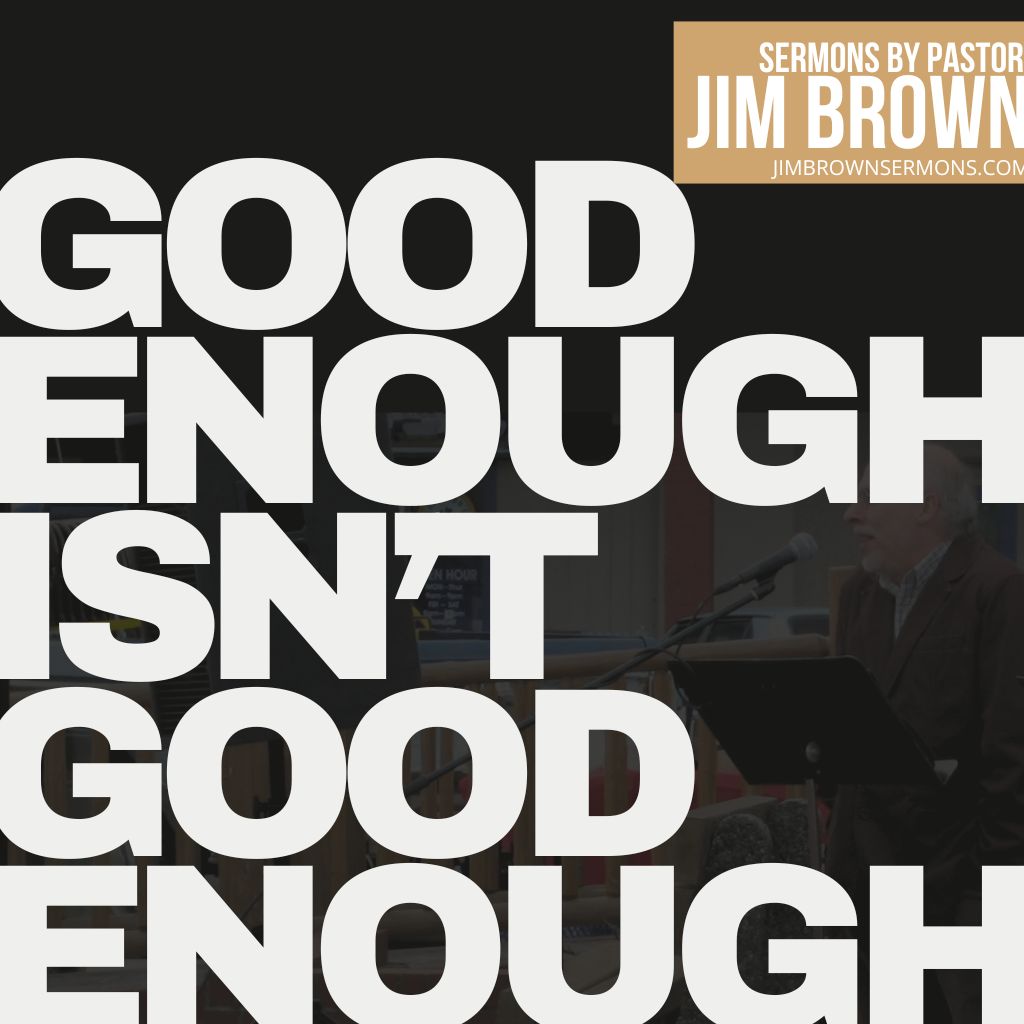
Good Enough Isn’t Good Enough | The Truth About a Relationship with God
Exodus 18, Leviticus, Numbers
Is ‘Good Enough’ Ever Enough?
We all have things we hold onto—some out of sentiment, some out of obligation. Maybe it’s an old, broken workbench that has been passed down for generations, even though it barely stands on its own. Or maybe it’s a gift that you appreciate but don’t really know what to do with.
In a way, many of us treat our relationship with God the same way. We have faith, but we’re unsure what it really means to follow Him. We do enough to get by, but we wonder: Is this enough?
Some people approach faith like a checklist—praying when needed, attending church, following certain rules, and hoping that’s all God requires. But faith isn’t about doing just enough. Good enough isn’t good enough.
A real relationship with God isn’t built on obligation—it’s built on faith, obedience, and trust.
God’s Desire for a Real Relationship with His People
From the beginning, God designed humanity for a deep relationship with Him. In the Book of Exodus, we see His plan unfold as He delivers His people from Egypt, leading them toward freedom.
But something happened—sin entered the world, and that relationship was broken. Instead of trusting God, humanity turned to self-reliance, and that struggle has continued throughout history.
“Now if you obey me fully and keep my covenant, then out of all nations you will be my treasured possession. Although the whole earth is mine.” Exodus 19:5 (NIV)
God didn’t rescue His people just to give them a long list of rules to follow. He set them apart so they could know Him personally. His commands were always meant to strengthen faith, not replace it.
But just like the Israelites, we often choose our way over Yahweh’s way.

Jesus Fulfills the Law: What That Means for Us Today
Many people think of the Old Testament law as a burden—a list of rules that are impossible to follow. But that was never its purpose.
The law was given as a guide, showing God’s people how to live in holiness and obedience. It was never a substitute for faith, and it was never meant to be a way to earn salvation.
““Do not think that I have come to abolish the Law or the Prophets; I have not come to abolish them but to fulfill them.” Matthew 5:17 (ESV)
This is where Jesus Christ, the same yesterday, today, and forever (Hebrews 13:8) changes everything. He didn’t come to eliminate the law—He came to fulfill it. Through His sacrifice, we are no longer bound by rituals or rule-keeping, but we are called to faithfulness.
Obedience is not about legalism—it’s about living in trust and devotion to God.
Faith and Obedience: The Key to a Relationship with God
Some people think following God is about doing enough to get by. But real faith doesn’t ask, “How much is enough?”—it asks, “How can I give God my whole heart?”
“But if you look carefully into the perfect law that sets you free, and if you do what it says and don’t forget what you heard, then God will bless you for doing it.” James 1:25 (NLT)
Many of us struggle with faith over fear—we’re afraid to let go of control, afraid to trust God completely. But true obedience comes from a heart that trusts Him fully.
“We love because He first loved us.” 1 John 4:19 (NIV)
Faithfulness isn’t about obligation—it’s about love and trust.
Set Apart for God: Living in Holiness and Faith
When God gave the law to the Israelites, He wasn’t just giving them commands—He was calling them to be set apart for Him.
“You must be holy because I, the Lord, am holy. I have set you apart from all other people to be my very own.” Leviticus 20:26 (NIV)
Holiness isn’t about perfection—it’s about devotion. It’s choosing God’s way over the world’s way. It’s living in a way that reflects faith and obedience.
“Do not love this world nor the things it offers you, for when you love the world, you do not have the love of the Father in you.” 1 John 2:15 (NLT)
A relationship with God requires commitment, not just convenience.
How to Grow in Faith and Trust God Completely
So, how do we move from rule-following to real faith? How do we grow deeper in our relationship with God?
Here are three practical ways:
1️⃣ Surrender Control – Let go of the need to do things your way and trust God’s way. Faith means believing that He knows what’s best for you.
2️⃣ Prioritize Holiness – Don’t just blend in with the world. Live differently because you belong to God.
3️⃣ Embrace Faith Over Fear – Stop worrying about whether you’re good enough and start trusting that God’s grace is enough.
“If we live, we live for the Lord; and if we die, we die for the Lord. So, whether we live or die, we belong to the Lord.” Romans 14:5-8 (NIV)
When you fully surrender to God, you’ll experience true freedom.
Conclusion: Is Good Enough Ever Enough?
The answer is simple: No.
God isn’t asking for just enough—He’s calling us to total trust and devotion. A true relationship with God isn’t built on fear, rules, or performance—it’s built on faith, obedience, and love.
“Now if you obey me fully and keep my covenant, then out of all nations you will be my treasured possession.” Exodus 19:5 (NIV)
You don’t have to wonder if you’re doing enough. You don’t have to live in fear of failure.
All God asks is that you trust Him completely.
Key Takeaways
- Jesus fulfills the law—faith and obedience are the key to a real relationship with God.
- Holiness means being set apart, not blending in with the world.
- Faith isn’t about doing enough—it’s about trusting enough.
Are you ready to stop asking, “How much is enough?” and start living in faith and obedience?

More Resources and Sermons
If you’re looking to dive deeper into Christian podcasts, faith and prayer, and sermons on faith, check out our other resources on the website. Learn more about how to grow in faith, trusting God in hard times, and Christian sermons online to strengthen your walk with God.
Original Sermon Date: October 23, 2005
Thank you for visiting! Some of the links in this post are affiliate links, and we may earn a small commission at no additional cost to you. These are resources that we would recommend regardless of whether we earn a commission or not. The income generated helps cover website maintenance costs, allowing us to continue sharing sermons, resources, and content with you. We appreciate your support!
© 2025 Sermons by Pastor Jim Brown www.jimbrownsermons.com All rights reserved.
CHECK OUT LAST WEEK’S SERMON
YAHWEH OR MY WAY | Lean Not On Your Own Understanding
If you’re looking to dive deeper into Christian podcasts, faith and prayer, and sermons on faith, check out our other resources on the website. Learn more about how to grow in faith, trusting God in hard times, and Christian sermons online to strengthen your walk with God.
RECENT SERMONS
Ep 21: HEARTS OF STONE | Dependence on God Unlocks Transformation
When faith over feelings fails, dependence on God unlocks true transformation. Grow stronger in faith and prayer through this powerful Christian podcast.
DEV 1: WHEN YOU’RE TIRED OF HOLDING IT ALL TOGETHER | Trust In God
Feeling overwhelmed? Learn how to trust in God, surrender control, and find peace through this encouraging devotional based on Haggai 1:5.
Ep 20: Back TO BASICS | The Life-Changing Call to Surrender to God
When life feels off track, it’s time to surrender to God. This powerful message reveals how faith, identity, and revival begin with full surrender.
Ep 19: IT’S ALL DOWNHILL FROM HERE | Submit to God for Real Freedom
Ep 18: THINKING BACK LOOKING AHEAD | God’s Love Never Fails
Find hope in the midst of uncertainty as this sermon reveals how God’s love, mercy, and faithfulness remain steady—even when life doesn’t go as planned.
EP 17: WE NEED A KING | Finding True Security in God
Feeling lost and insecure? True security in God comes from trusting Him completely. Learn how seeking God brings peace and strength.

